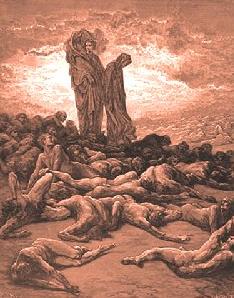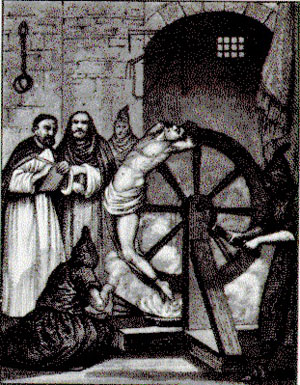 Protestants reject out-of-hand the notion of 'purgatory'. Purgatory is said to be a Roman Catholic conjuring having nothing to do with the economy of God. With the advent of Luther's Reformation (AD 1517 --->), a theological tradition that considers the refining fires believers go through before entrance into heaven was summarily trashed. In its place was drafted what I call a 'punctuated sanctification'. That is, the notion that salvation through Christ instantaneously absolves one of all one's sins, that they are 'new creatures' (II Cor. 5:17-18) already fit for eternity in heaven with God.
Protestants reject out-of-hand the notion of 'purgatory'. Purgatory is said to be a Roman Catholic conjuring having nothing to do with the economy of God. With the advent of Luther's Reformation (AD 1517 --->), a theological tradition that considers the refining fires believers go through before entrance into heaven was summarily trashed. In its place was drafted what I call a 'punctuated sanctification'. That is, the notion that salvation through Christ instantaneously absolves one of all one's sins, that they are 'new creatures' (II Cor. 5:17-18) already fit for eternity in heaven with God.To be clear, salvation does instantaneously absolve a person of his/her sins. However, the fact that we continue to experience character challenges, persecutions, tests of faith, temptations, habitual sins, and the need to regularly ask Christ to quicken His forgiveness in our lives speaks against a completed, or 'punctuated' sanctification upon salvation. Our characters are not fully reformed when we receive Christ's salvation. We still have to "work out our salvation with fear and trembling" (Phil. 2:12); we still have to "purify ourselves" from everything in us that expresses itself against God (2 Cor. 7:1).
And given that we presently live imperfect lives, what makes us think that at the close of our lives, when we see dusk settling over our life-force and the darkness draws near, that we will have somehow suddenly perfected ourselves and worked out our salvation (i.e., completed our sanctification)? Could it be that classical Roman Catholic theology has been right about purgatory? That is, perhaps Protestants reacted too quickly to reject the doctrine of purgatory since it was too close to the blasphemy of selling indulgences (a papal device that essentially states you can buy time out of purgatory). The association was too much like rubbing sandpaper over a fresh wound. On reflection, almost 600 years later, however, purgatory does seem to make some sense.
Gregory A. Boyd makes a few interesting observations about this issue here, on his blog.
What are your thoughts?
